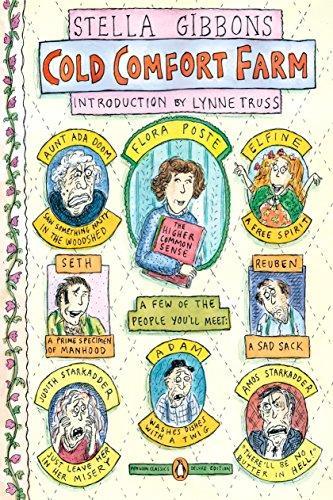Stella Dorothea Gibbons (5 January 1902 – 19 December 1989) was an English author, journalist, and poet. She established her reputation with her first novel, Cold Comfort Farm (1932) which has been reprinted many times. Although she was active as a writer for half a century, none of her later 22 novels or other literary works—which included a sequel to Cold Comfort Farm—achieved the same critical or popular success. Much of her work was long out of print before a modest revival in the 21st century. The daughter of a London doctor, Gibbons had a turbulent and often unhappy childhood. After an indifferent school career she trained as a journalist, and worked as a reporter and features writer, mainly for the Evening Standard and The Lady. Her first book, published in 1930, was a collection of poems which was well received, and through her life she considered herself primarily a poet rather than a novelist. After Cold Comfort Farm, a satire on the genre of rural-themed "loam and lovechild" novels popular in the late 1920s, most of Gibbons's novels were based within the middle-class suburban world with which she was familiar. Gibbons became a Fellow of the Royal Society of …
Stella Gibbons
Author details
- Born:
- Jan. 5, 1902
- Died:
- Jan. 5, 1989
External links
Stella Dorothea Gibbons (5 January 1902 – 19 December 1989) was an English author, journalist, and poet. She established her reputation with her first novel, Cold Comfort Farm (1932) which has been reprinted many times. Although she was active as a writer for half a century, none of her later 22 novels or other literary works—which included a sequel to Cold Comfort Farm—achieved the same critical or popular success. Much of her work was long out of print before a modest revival in the 21st century. The daughter of a London doctor, Gibbons had a turbulent and often unhappy childhood. After an indifferent school career she trained as a journalist, and worked as a reporter and features writer, mainly for the Evening Standard and The Lady. Her first book, published in 1930, was a collection of poems which was well received, and through her life she considered herself primarily a poet rather than a novelist. After Cold Comfort Farm, a satire on the genre of rural-themed "loam and lovechild" novels popular in the late 1920s, most of Gibbons's novels were based within the middle-class suburban world with which she was familiar. Gibbons became a Fellow of the Royal Society of Literature in 1950. Her style has been praised by critics for its charm, barbed humour and descriptive skill, and has led to comparison with Jane Austen. The success of Cold Comfort Farm dominated her career, and she grew to resent her identification with the book to the exclusion of the rest of her output. Widely regarded as a one-work novelist, she and her works have not been accepted into the canon of English literature—partly, other writers have suggested, because of her detachment from the literary world and her tendency to mock it.
